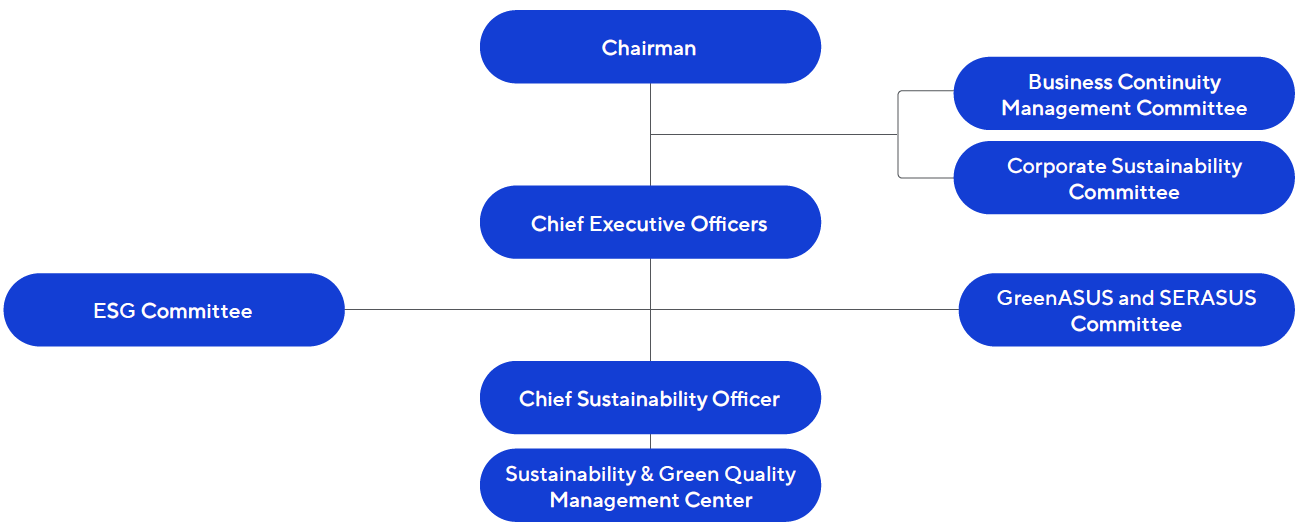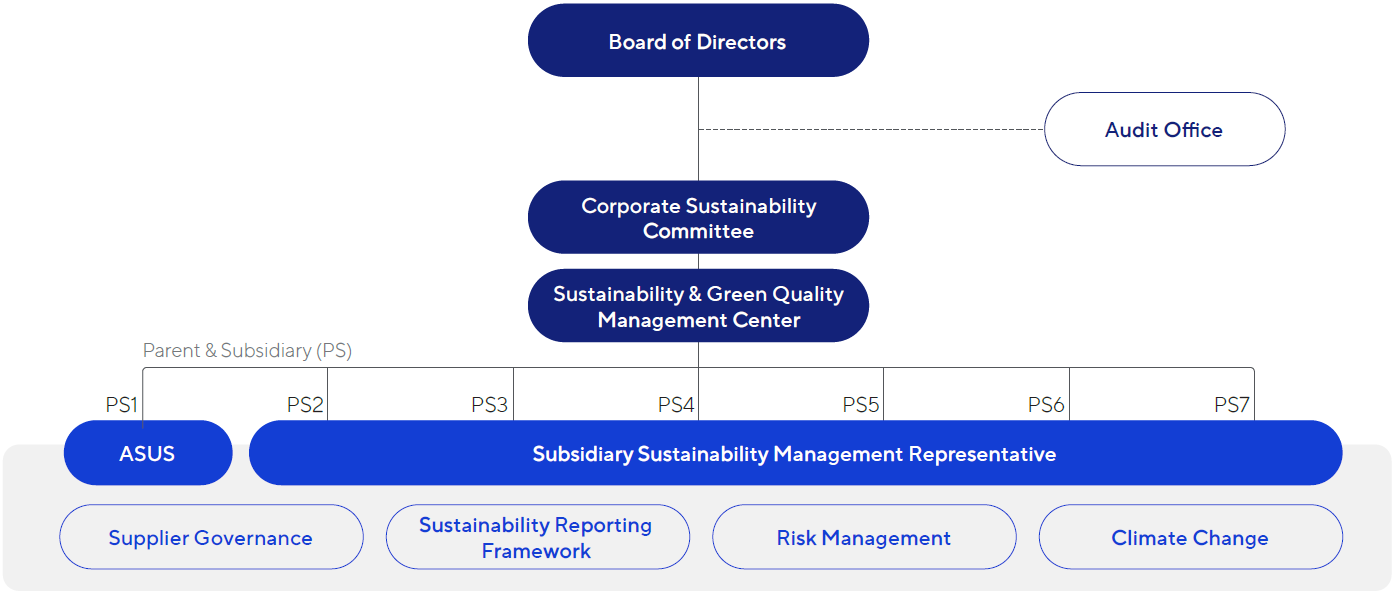ASUS, in accordance with the Responsible Business Alliance (RBA) standards and the “Corporate Governance Best Practice Principles for TWSE/GTSM Listed Companies, ” designates the Human Resources Center as the dedicated unit for promoting corporate integrity. It has established the “Employee Code of Conduct,” which includes policies on anti-corruption, anti-bribery, insider trading, intellectual property rights, and proper information disclosure, and also sets forth Anti-Corruption and Anti-Bribery Policies to ensure that business activities comply with integrity and regulatory standards. The company adopts a zero-tolerance policy towards any form of corruption.
To enhance employees ’ ethical awareness and regulatory compliance, ASUS has made the “Employee Code of Ethical Conduct ” (including anti-corruption training) a mandatory course for all employees —including full-time, part-time, and contract staff—with annual refresher training to further foster a strong internal culture of professional ethics. Management is required to lead by example, ensuring that all employees not only demonstrate professional competence but also uphold the highest ethical standards. For external partners, ASUS has established a “Supplier Code of Conduct ” and requires the signing of an “Integrity Commitment Letter ” to ensure that all supply chain partners adhere to the same ethical and legal standards.
In cases where external entities violate regulations and cause harm to the company, ASUS will pursue accountability and compensation in accordance with the provisions of the Integrity Commitment Letter and will take all necessary legal action.
Board of Directors
The Board of Directors of ASUS takes high efficiency, transparency, diversity, and professionalism as key measures for strengthening corporate governance. Our Board of Directors consider professional skills such as business judgments, accounting and financial analysis, operation and management, crisis response, knowledge of the industry, international market perspectives, leadership, and decision-making, avoid blind spots in decision making. All members of the Company's Board of Directors are elected based on a candidate nomination system. In the shareholders' meeting held in June 2022, according to the “Rules for Election of Directors”, the 13th Board of Directors were elected, which was formed by 15 Directors (includes 13 male and 2 female), and among which 5 were Independent Directors. We aim to leverage the professional knowledge of outstanding members of the industry to introduce the viewpoints of external stakeholders, and to improve the quality of business operations.
The name and education of each Board member as well as the holding positions of other companies are shown in the Annual Report.
ASUS requires an average attendance rate of 85% of board members, based on the Corporate Governance Evaluation Indicators. On June 8, 2022, the ASUS Shareholders' Meeting elected two female directors (one each for general directors and independent directors), and the number of independent directors was increased from the original three to five.
All members of the Board of ASUS are highly disciplined to avoid any conflicts of interest, and the relevant statement is clearly provided in “Rules and Procedures of Board of Directors Meetings”. In case the Directors or Managers of ASUS undertake the business operation within the scope of business run by ASUS for themselves or in favor of a third party, they are required by law to obtain the approval of the General Meeting of shareholders in advance.
Number of Directors
15
Number of Female Directors
2
Number of Independent Directors
5
Percentage of Independent Directors
33%
Remuneration Policy for Directors and Managers
Board Performance Evaluation
To implement sound corporate governance and enhance both the functionality and operational efficiency of the Board of Directors, ASUS has established the “Self-Evaluation of the Board of Directors.” These measures stipulate that at least one performance evaluation must be conducted annually for the Board of Directors, individual board members, and all functional committees. The evaluation covers areas such as participation in company operations, understanding of corporate goals and missions, director selection and ongoing education, and internal controls. In addition, at least once every three years, the Board’s performance evaluation must be conducted by an external independent professional institution or a team of external experts and scholars. An external evaluation is scheduled for 2025.
For the 2024 internal evaluation, board members completed self-assessment questionnaires, and the results were reported to the Board of Directors in January 2025 as follows:

- Overall Board of Directors: The Board’s overall operations were assessed as being effective, in compliance with corporate governance requirements, and capable of fulfilling its functions.
- Individual Board Members: Board members received positive evaluations across all assessment criteria.
- Functional Committees: All functional committees were found to operate effectively, in alignment with corporate governance requirements, and to have fulfilled their respective duties, thereby enhancing the overall effectiveness of the Board.
Linking ESG Performance with Executive Compensation
To reinforce sustainability governance, in 2023 the variable compensation of the Co-Chief Executive Officers was tied to sustainability performance, using the achievement rates of ASUS’s global RE100 commitment and the Group’s Science-Based Targets (SBT) decarbonization goals as evaluation metrics. In 2025, variable compensation for the Co-Chief Executive Officers, Chief Operating Officer, Chief Sustainability Officer, and other senior executives was linked to sustainability performance across ASUS’s four strategic sustainability pillars, allowing up to a 10% adjustment in variable pay weight.
Climate Action
- Greenhouse Gas Reduction Targets
- Renewable Energy Usage Achievement Rate
Circular Economy
- Use of Environmentally Friendly Materials
- Revenue Share from Eco-Labelled Products
Responsible Manufacturing
- Supplier RBA Non-Conformance Improvement Rate
- Percentage of Responsible Minerals from Certified Smelters
Value Creation
- Number of Industry Talent Trained
Business unit leaders promoting eco-friendly products and low-carbon supply chain management follow ASUS’s SBT decarbonization roadmap. The 2030 target of reducing Scope 3 emissions from “Purchased Goods and Services” and “Use of Sold Products” by 30% serves as the evaluation metric, with variable compensation weights adjustable by up to 10%.
Functional Committee
- Details of Audit Committee and Remuneration Committee, please visit Corporate Governance/Board Committees of Investor Relations website for further information.
- Details of Information Security Committee, please refer to Information Security Management website for further information.
Audit Committee
To enhance the Board of Directors’ oversight of the quality and integrity of the company’s accounting, auditing, financial and non-financial reporting processes, as well as financial and operational controls, ASUS has established an Audit Committee. The committee is composed of five independent directors.
Remuneration Committee
The Remuneration Committee is composed of three independent directors and is tasked with assisting the Board of Directors in formulating and evaluating the company’s overall compensation and benefits policies, as well as the remuneration of directors and managers. The committee ensures that the company’s compensation arrangements comply with relevant regulations and are sufficient to attract top talent.
Business Continuity Management Committee
The Business Continuity Management Committee (BCM Committee) is composed of five independent directors, with all independent directors bringing external stakeholder concerns into the risk assessment process. The Co-CEOs and COO regularly convene cross-departmental risk management meetings to develop strategies for addressing major interdepartmental risk-related issues, and report regularly to the Board of Directors.
Corporate Sustainability Committee
The Corporate Sustainability Committee was established in 2025 and is composed of five independent directors and two Co-CEOs. As the highest-level sustainability management body at ASUS, the committee is responsible for reviewing the Group’s sustainability operations and implementation progress, reporting annually to the Board of Directors. Under the committee, the Sustainability Center coordinates quarterly meetings with sustainability representatives from each subsidiary to collaboratively develop and implement action plans addressing group-wide sustainability issues.
Sustainability Governance
Sustainability and Green Quality Management Center
ASUS established a unit dedicated to sustainable development in 2009 to monitor global sustainable development trends, analyze sustainability issues in governance, environment, and society. It integrated the core of operation with our innovation in product and service to form strategic sustainable direction to execute relevant programs. The Sustainability and Green Quality Management Center is established with the CEO serving as the highest-level manager, as mandated by the Chairman. The CEO is responsible for overseeing the sustainability projects and ensuring the achievement of goals related to material issues. The unit is led by the Chief Sustainability Officer (CSO) who is responsible for analyzing the trend of global sustainability, managing sustainability policy, objectives, and actions. The CSO regularly reports to the Board of Directors each year and submits the policies and targets, key sustainability projects and the performances for review.

Corporate Sustainability Committee
To address evolving sustainability trends and seize accompanying opportunities and challenges, the ASUS Corporate Sustainability Committee was established in 2025. Comprised of five independent directors and the two Co-Chief Executive Officers, it serves as ASUS’s highest-level sustainability governance body. The Committee reviews the Group’s sustainability management operations and execution progress and reports annually to the Board of Directors. Under its oversight, the Sustainability Center convenes quarterly meetings with Sustainability Management Representatives from each subsidiary to jointly formulate and implement action plans addressing Group-wide sustainability issues.

GreenASUS Steering Committee & SERASUS Steering Committee
To horizontally implement the ESG-related ISO management system standards across various departments within the Company, we have established the "GreenASUS and SERASUS Management Committee." Senior management has appointed a management representative responsible for the Company's ISO 9000 Quality Management System, ISO 14001 Environmental Management System, ISO 45001 Occupational Health and Safety Management System, and QC 080000 Hazardous Substance Process Management System.
It holds periodic meetings and sends e-newsletters with contents including but not limited to companywide sustainable development information, the recent activities of managementsystem, and the latest legal announcements. The members of the Committee come from the business units, procurement department, customer service, administration, legal and other departments. The communication and coordination are carried out across the units, and the resources can be effectively allocated throughout the company. All ASUS people can work together in a consistent direction to combine the sustainability and core of operation to become one of the competitiveness advantages.
| Management System | ISO 9001 | ISO 14001 | ISO 45001 |
|---|---|---|---|
| Coverage Rate* | 100% | 100% | 62.5% |
*Certification coverage rate is calculated for companies within a group whose operations encompass manufacturing and have an employee count exceeding 100.
ESG Committee
To strengthen horizontal cross-unit communication within the company, ESG Committee was established in 2022 and established Product Sustainability Management Policy. Committee members were from each business unit as well as the procurement, global supply chain management center, design center, certification, marketing, sales and other support units. We consolidate the sustainability progress and requirements of each unit, facilitating the centralized integration of resources. This ensures the efficient allocation of resources, enabling all departments to progress in a unified sustainability direction.

